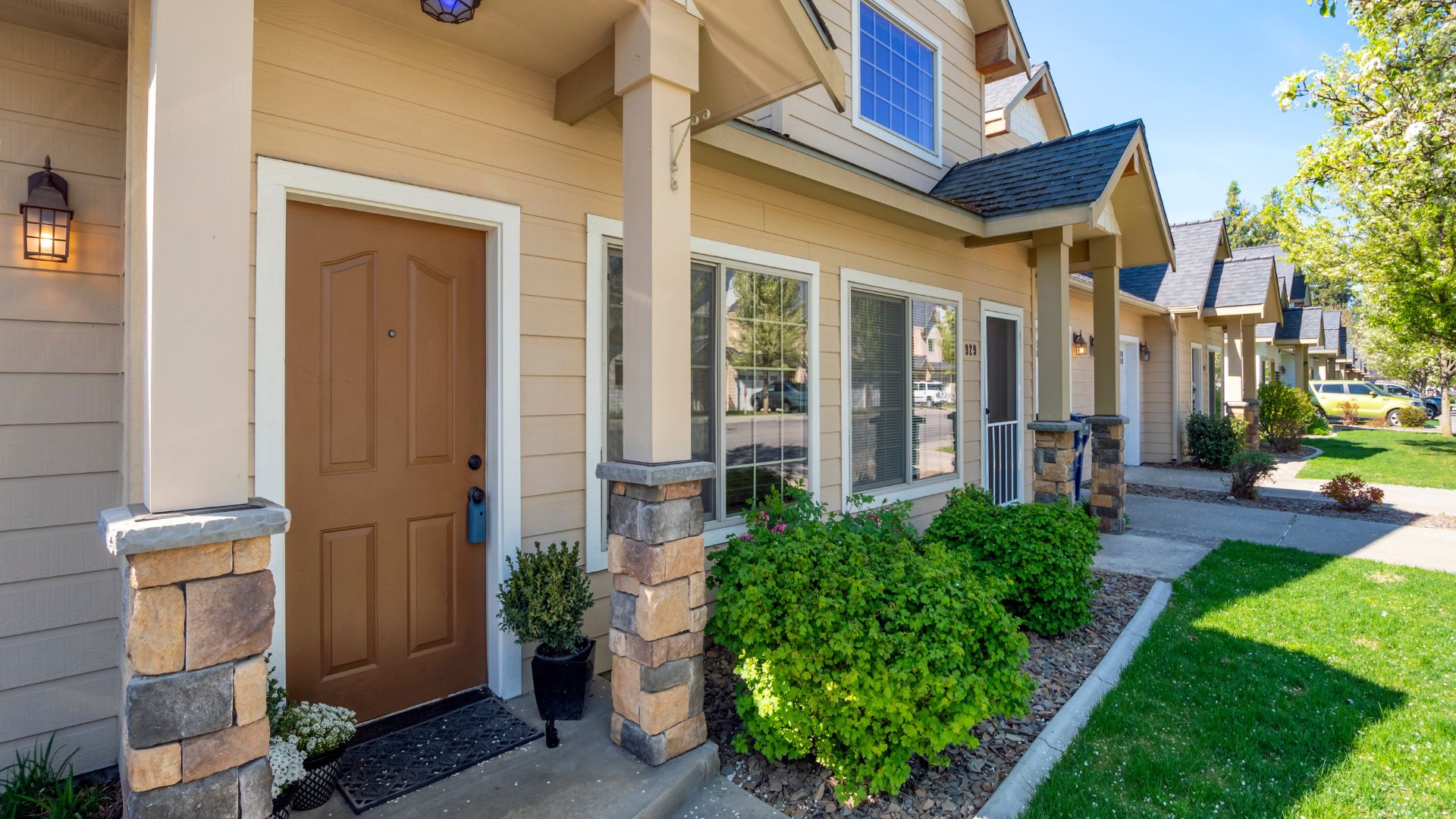Table of Contents
In this article:
- Townhomes investments can be lucrative, hower, it is a very niche market
- As a more affordable option, investing in townhomes can lead to a faster return on investment and positive cashflow.
- Townhomes may be subject HOA fees and regulations, so renting out a townhome may require closer management.
Investing in townhomes can be a lucrative investment that has both short-term and long-term payoffs. Unlike apartments, townhomes are more spacious and usually offer more storage, outdoor spaces, and a private garage or parking. These are hot selling points that can push apartment hunters over the edge and into a townhome.
Why Townhomes Are A Practical and Profitable Investment
Townhomes or townhouse apartments are multi-floor units connected to one or more additional units. These unique dwellings offer renters more space than an apartment and a lower purchase price than a traditional home for potential buyers, especially first-time home buyers.
A townhome will have its own private entrance and, in many cases, a garage, basement, backyard, and even a driveway. They are often two or even three stories high and offer more storage than an apartment. These features make a townhome more desirable than an apartment for many tenants.
In most areas, a townhome will come with the land it sits on, making the owner (that’s you) responsible for any exterior maintenance needs. As the owner, you can expect fewer maintenance costs than a traditional rental property and simpler, more streamlined landscaping requirements.
In many cases, there is a homeowner’s association (HOA) connected to a townhouse complex that may assume some of the exterior responsibilities, taking them off your plate.
So what does this all mean for investors like you?
Lower barrier to entry. Fewer operating expenses. Maximum profitability.
If you’re looking to break into a new real estate market or you want to get your feet wet with a lower-cost investment, townhomes may be the right fit.
Understanding The Townhouse Market
In recent years, market studies show that over 44 million housing units were occupied by renters and that this number has been on a steady increase since the 1970s. Due to the increasing costs of home ownership and out-of-scope mortgage rates, this number is expected to continue in this trend, making townhouses a perfect middle-of-the-road solution.[1]
In today’s housing market, townhouses come in all shapes and sizes, from small loft units to expansive luxury townhomes that feel more like traditional housing. More common in urban and suburban areas, townhomes tend to be newer than many of the lower-cost single-family homes.
In a luxury townhome complex, renters may have access to amenities such as a community gym, a pool and hot tub, a children’s playground, a dog park, and even a shared event space or commercial kitchen. These amenities appeal to renters that are looking to settle into a space that’s more private than an apartment but more affordable than a home with access to similar amenities.
A Townhouse Vs. A Condo: What’s The Difference?
A condo is similar to a townhouse in functionality and access to amenities. However, you will only have ownership of the individual unit, not the land beneath. This can be challenging for the owner to be stuck with too little control over the surrounding space and zero control over the exterior. In addition to the land, owning or renting a townhouse offers more freedom and control over the unit as a whole.
Advantages Of Investing In A Townhouse

This portion of the real estate market is often overlooked because it may require a more complex deal structure to ensure you still come out happy and profitable. However, there are several clear benefits to this strategy that could inspire your next deal.
Lower Barrier To Entry
Real estate investing can be an intimidating and costly venture. However, it’s okay to start on a more affordable playing field. Townhouses could provide that opportunity to build your real estate portfolio with a smaller financial investment.
Appreciation Potential
Unlike mobile homes, townhouses offer a stronger market value appreciation, similar to traditional real estate investments. In most markets, townhouses follow the same patterns as single-family homes in terms of the rise and fall of standard market value.
Affordability Leads To Positive Cash Flow
When you have to pay less upfront to acquire the investment, you can reach a positive and profitable cash flow much faster than with traditional real estate. Depending on the state of the housing market where your townhouse is located, the right deal could pay off big right away.
Less Maintenance
The cost of maintaining a single-family home includes regular lawn mowing, landscaping, siding repairs, and exterior window repairs. When investing in townhomes, you may not have to deal with any of these potential expenses. Either they aren’t necessary, or the HOA may handle them on your behalf.
Offers Greater Privacy Than Apartments and Condos
Townhomes are a much stronger investment than apartments and condos when considering the increased privacy. There are no neighbors above and below your unity in a townhouse. While there are neighbors on one or both sides, you are not sharing a ceiling and a floor as well.
With each unit offering its own private entrance, tenants or new owners will have an experience that’s more aligned with traditional home ownership than in an apartment or a condo.
Potential Disadvantages Of Investing In A Townhouse
While there’s plenty of money to be made in the townhouse market, there can be a few disadvantages that you should consider before investing in townhomes.
More Niche Market
Tenants and potential buyers who are interested in townhomes represent a much smaller portion of the real estate market as a whole. Most people are more familiar with apartments, and if they can afford a single-family home, they’re more likely to pursue that type of investment themselves.
Homeowner’s Association Fees & Rules
Most townhome complexes are associated with an HOA. HOAs can be both a blessing and a curse, depending on how much they cost and how involved they are in day-to-day operations.
Some HOAs are low maintenance and affordable but don’t provide enough of the services you need to ensure the unit is well-maintained. On the other end of the spectrum, they can ask for top dollar and require a long list of rules and regulations that either you or the tenant must adhere to.
Before you get too discouraged, rest assured that there are many HOAs that exist in the middle, and those are the ones you want to invest in.
Small Outdoor Spaces
Growing families or people with lots of active pets may not find townhomes to be a workable solution as they only provide small private outdoor spaces, if any. While this works in your favor in terms of maintenance, it could prove to be a roadblock for some buyers.
More Difficult To Rent Or Resell
As mentioned before, townhomes suit a more niche portion of the real estate market. This means when you’re ready to sell your asset, or when you need to find someone to occupy it, it may take longer to find just the right deal or that perfect-fit tenant.
This shouldn’t discourage you from investing in townhomes completely, but it’s important to be prepared for the process to take a little longer than with a single-family home.
Tips For Investing In Townhomes
Have you ever heard the phrase, “the riches are in the niches?” It’s true in many industries, and that includes investing in townhomes. To help you further explore this real estate investment strategy, here are our top tips you don’t want to miss.
Know The State Of The Rental Market
Where there is a housing boom, there is also a rental boom. Your job is to fill the gap in the market between homeownership and renting an apartment by offering an irresistible property at a price that makes sense to the right tenant.
Know The HOA Fees And Responsibilities Inside And Out
Not only do you want to ensure your tenant is prepared to hold up their end of the bargain, but you also want to ensure the HOA stays in their lane.
Explore Alternative Financing Options
Traditional financing may be more difficult to secure when investing in a townhouse. But any veteran real estate investor will tell you that your success is directly connected to your ability to quickly access funds. Be sure to explore all of your options:
- Private money loans
- Capital investors
- Transactional funding
- Hard money loans
Start Investing In Townhomes
Reach out to the Teifke Real Estate development team to learn more about this process and begin your journey into investing in townhomes.
Frequently Asked Questions About Investing In Townhomes
Below are some of the most frequently asked questions about investing in townhomes.
Yes! If structured and managed properly, townhomes can be highly profitable. Don’t rush into a niche market without doing your research. Find the best possible deal, in the best possible location, with the best possible HOA terms you can find.
This depends on location, the state of the market, any upgrades that were completed, and the HOA arrangements. Well-researched and sound investments are likely to hold enough of their value to payoff long-term.
In many ways, it’s the same things that increase the value of a traditional home. Focus on elements that enhance the tenant or buyer experience, like kitchen and bathroom upgrades, adding on space where possible, exterior privacy measures, soundproofing, elevated energy efficiency, or smart-home integrations.
[1] Statista Research Department (2022, December 5). Number of renter occupied homes in the U.S. 2021. Statista. Retreived from https://www.statista.com/statistics/187577/housing-units-occupied-by-renter-in-the-us-since-1975/ 11 April 2023





